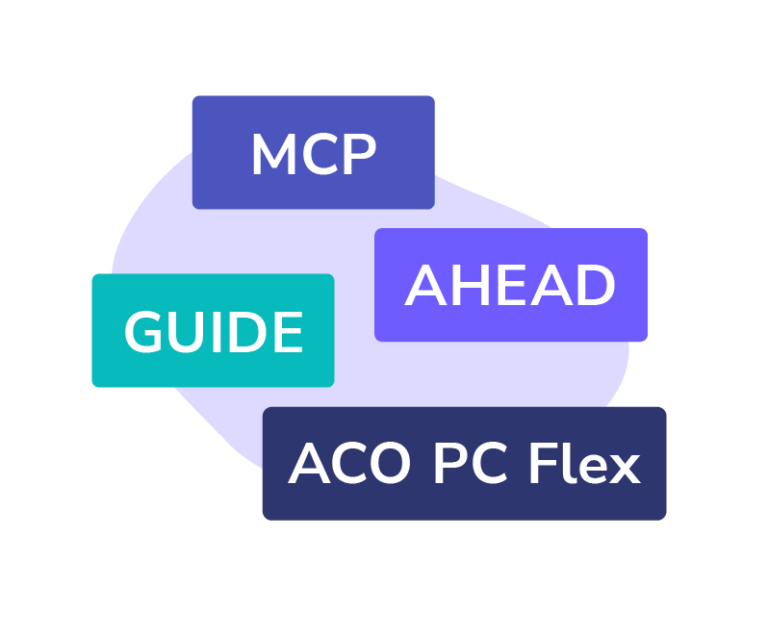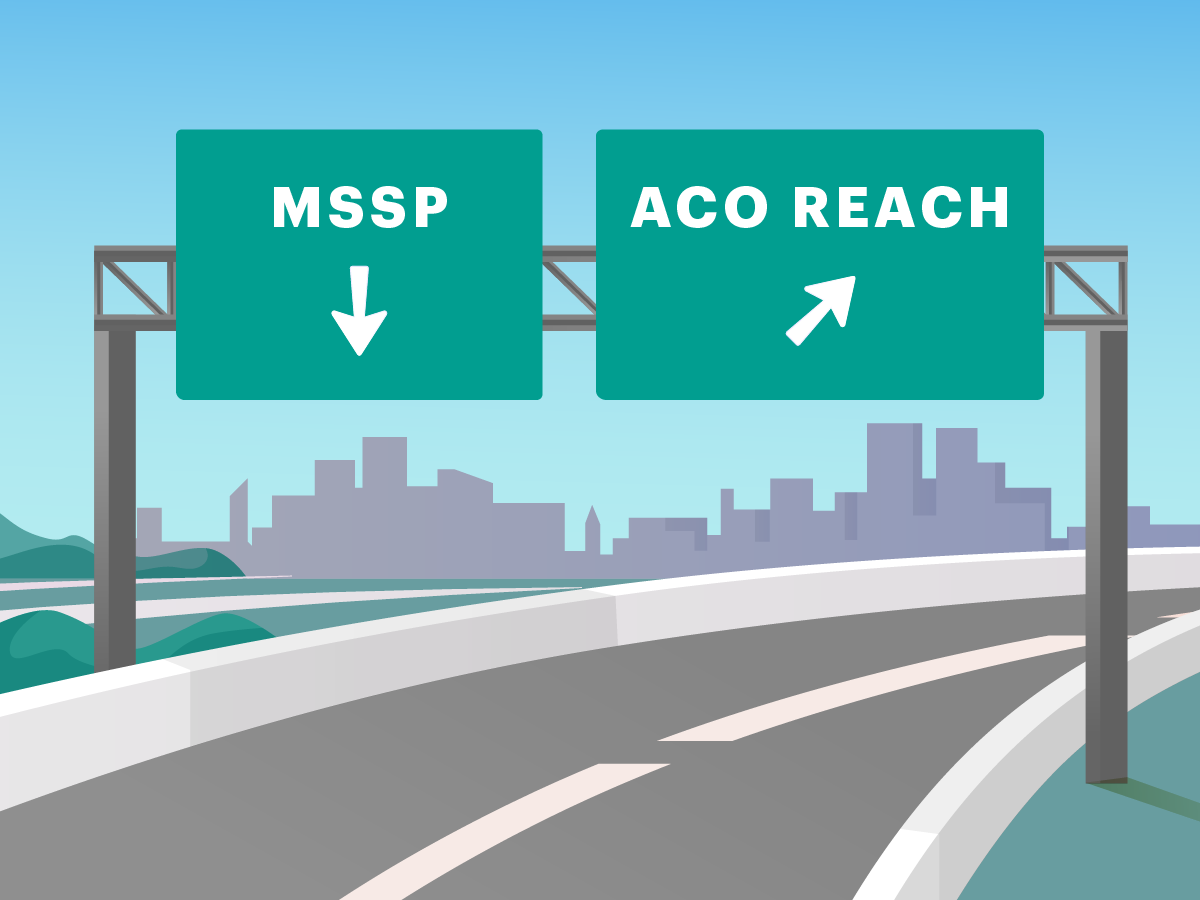Key Topics We’ll Cover
-
Medicare Shared Savings Program
- How has MSSP impacted patients, providers, and CMS?
- What changes are coming and how will they impact providers?
-
Accountable Care Organization Realizing Equity, Access,
- How has ACO REACH impacted patients, providers, and CMS?
- What changes are coming and how will they impact providers?
-
Additional Recent and Upcoming Value-Based Care Models
- What are their objectives and availability?
- Which are compatible with MSSP and ACO REACH?
Read on to learn more about the impact and evolution of these two payment models, as well as other recent and upcoming models shaping the future of value-based care.
MSSP Continues to Prove the Value of Value
The Medicare Shared Savings Program is a permanent alternative payment model that was established in 2012 as a way of leveraging quality measures and provider incentives to curb healthcare costs, while improving outcomes for Traditional Medicare patients.
As of 2024, MSSP has 480 participating ACOs providing care to over 10.8 million Traditional Medicare beneficiaries.4 This participation has a proven history of success, with 2022 — the most recent year with available performance data — marking the sixth straight year of cost improvements.5 CMS reported that MSSP saved Medicare more than $1.8 billion in 2022 while paying out about $2.5 billion to participating ACOs.6
PCP-led organizations underscored the cost savings that PCPs can drive — and capture — through value-based payment arrangements, with ACOs consisting of at least 75% primary care clinicians delivering an almost 30% improvement in per capita net savings compared with other similarly-sized ACOs.7 These results support years of research that have proven the value of primary care in improving patient outcomes and experiences.8
More importantly, looking beyond financial results and turning to patient quality of care, MSSP ACOs saw higher average performance on quality measures compared to similarly-sized clinician groups not in the program. This included higher performance for quality measures related to diabetes and blood pressure control; breast cancer and colorectal cancer screening; tobacco screening and smoking cessation; and depression screening and follow-up.9
Leaning Into Continuous Improvement
For providers participating in MSSP for Performance Years 2024 and 2025, CMS is rolling out a variety of improvements to address stakeholder feedback, including key changes across three areas.
- Quality Measures and Reporting
- Introducing new reporting options: CMS established “Medicare CQMs” as a valid collection type for quality reporting starting in 2024. Unlike other reporting options, Medicare CQMs allow ACOs to report quality information only for Traditional Medicare patients aligned to participating providers.
- Sunsetting legacy reporting options: The Web Interface many ACOs use to report quality information will sunset in favor of Medicare CQMs, MIPS CQMs and/or eCQMs. 2024 will be the last year ACOs can use the Web Interface for submission.
- Improving transparency: As of 2024, CMS will calculate the 40th percentile MIPS Quality performance score and deliver this information to ACOs before the start of the Performance Year. This will allow ACOs to collaborate with their providers to better understand and plan around quality thresholds.
- Health Equity
- Incentivizing care for underserved populations: As of 2024, CMS will apply a health equity bonus to ACO quality scores to account for the difficulty of providing high-quality care for underserved populations.
- Beneficiary Alignment
- Expanding beyond physicians: Starting in 2025, assignable beneficiaries will include those who receive primary care services from non-physician practitioners during the 12-month assignment window.
This includes nurse practitioners, physician assistants, and clinical nurse specialists, highlighting CMS’ move toward recognizing the importance of other clinicians in delivering high-quality primary care.
- Expanding beyond physicians: Starting in 2025, assignable beneficiaries will include those who receive primary care services from non-physician practitioners during the 12-month assignment window.
The Growing Reach of ACO REACH
Building on the success of MSSP, CMS’ innovation arm — the Centers for Medicare and Medicaid Innovation Center (CMMI) — launched an ACO model in 2021 called the Global and Professional Direct Contracting (GPDC) Model. GPDC created more incentives for care coordination and team-based care, while also offering providers the opportunity to take on increased responsibility — and potential financial rewards — for delivering quality care at a lower cost.
The GPDC model quickly evolved into ACO REACH, which layered on new mechanisms to improve health equity; promote provider leadership and governance; and fine-tune the quality withhold and benchmark discount to improve the model for providers.
Accelerating the Transition To — And Impact Of — Value-Based Care
As of 2024, ACO REACH has 122 participating ACOs providing care to over 2.6 million people with Traditional Medicare,10 representing a 24% increase in lives covered over 2023.11
Even more important than its growth are the results. In 2022, CMS reported that ACO REACH’s predecessor, the GPDC model, saved Medicare $371.5 million while paying out $484 million to participating ACOs.12
By offering an option that caters to providers further down the path of value-based care, ACO REACH complements MSSP’s efforts to improve patient experiences and outcomes, increase earnings for primary care organizations and providers, and drive cost savings for CMS.
Source: PY2022 performance results from CMS
The Ongoing Evolution of ACO REACH in 2025 and Beyond
Pearl will follow these developments as we continue to guide PCPs to the best value-based payment models based on their unique needs and preferences.
A Continuously-Evolving Landscape
Beyond MSSP and ACO REACH, CMMI has recently focused on launching new value-based care models to address specific needs across subgroups of patients, providers, and geographies.
How much more could your practice earn with Pearl?
Try out Pearl’s Value-Based Care Advisor tool to find out how much your practice could earn with ACO REACH.


See what VBC could mean for your practice, in practice.
Share a few key details with us to receive a personalized, data-driven analysis tailored to your specific practice.

Interested in which recently-launched and upcoming models are compatible with MSSP and ACO REACH?
Taking a step back, we’re excited to see how these new models fit into CMS’ overarching strategy. MSSP offers an attractive option for those who prefer to remain in fee-for-service or minimize potential downside; ACO REACH supports those who want to maximize revenue upside and stability while lowering their administrative burden; and additional models take a more targeted approach to address specific gaps for Traditional Medicare patients and the providers who support them.
We expect 2024 to be another landmark year in value-based care, and will continue following new developments. Pearl Health is committed to helping primary care organizations and physicians navigate the transition to value, and we look forward to enabling more progress toward an equitable, accessible, cost-effective, and high-quality healthcare system for all!
Are you considering participating in MSSP or ACO REACH for 2025?
Join our complimentary webinar on May 21st to learn how to determine which is right for you.
- Centers for Medicare & Medicaid Services, “CMS Announces Increase in 2023 in Organizations and Beneficiaries Benefiting from Coordinated Care in Accountable Care,” January 2023.
- Centers for Medicare & Medicaid Services, “Participation Continues to Grow in CMS’ Accountable Care Organization Initiatives in 2024,” January 2024.
- Centers for Medicare & Medicaid Services, “CMS Finalizes “Pathways to Success,” an Overhaul of Medicare’s National ACO Program,” December 2018.
- CMS, “Participation Continues to Grow,” January 2024.
- Centers for Medicare & Medicaid Services, “Medicare Shared Savings Program Saves Medicare More Than $1.8 Billion in 2022 and Continues to Deliver High-quality Care,” August 2023.
- Centers for Medicare & Medicaid Services, “Performance Year Financial and Quality Results,” August 2023.
- CMS, “Medicare Shared Savings Program Saves Medicare More Than $1.8 Billion,” August 2023.
- Jama Network, “Quality and Experience of Outpatient Care in the United States for Adults With or Without Primary Care,” January 2019.
- CMS, “Medicare Shared Savings Program Saves Medicare More Than $1.8 Billion,” August 2023.
- CMS, “Participation Continues to Grow,” January 2024.
- CMS, “CMS Announces Increase in 2023,” January 2023.
- Centers for Medicare & Medicaid Services, “Global and Professional Direct Contracting (GPDC) Model Performance Year 2022 Financial and Quality Performance Results Highlights Fact Sheet,” October 2023.
- Centers for Medicare & Medicaid Services, “ACO REACH Model Performance Year 2024 (PY2024) Model Update – Quick Reference,” October 2023
- Sheldon Whitehouse, “Whitehouse, Barrasso, Welch, Tillis, Colleagues Introduce Bipartisan Legislation to Incentivize Better Health Care at Lower Costs,” December 2023.



